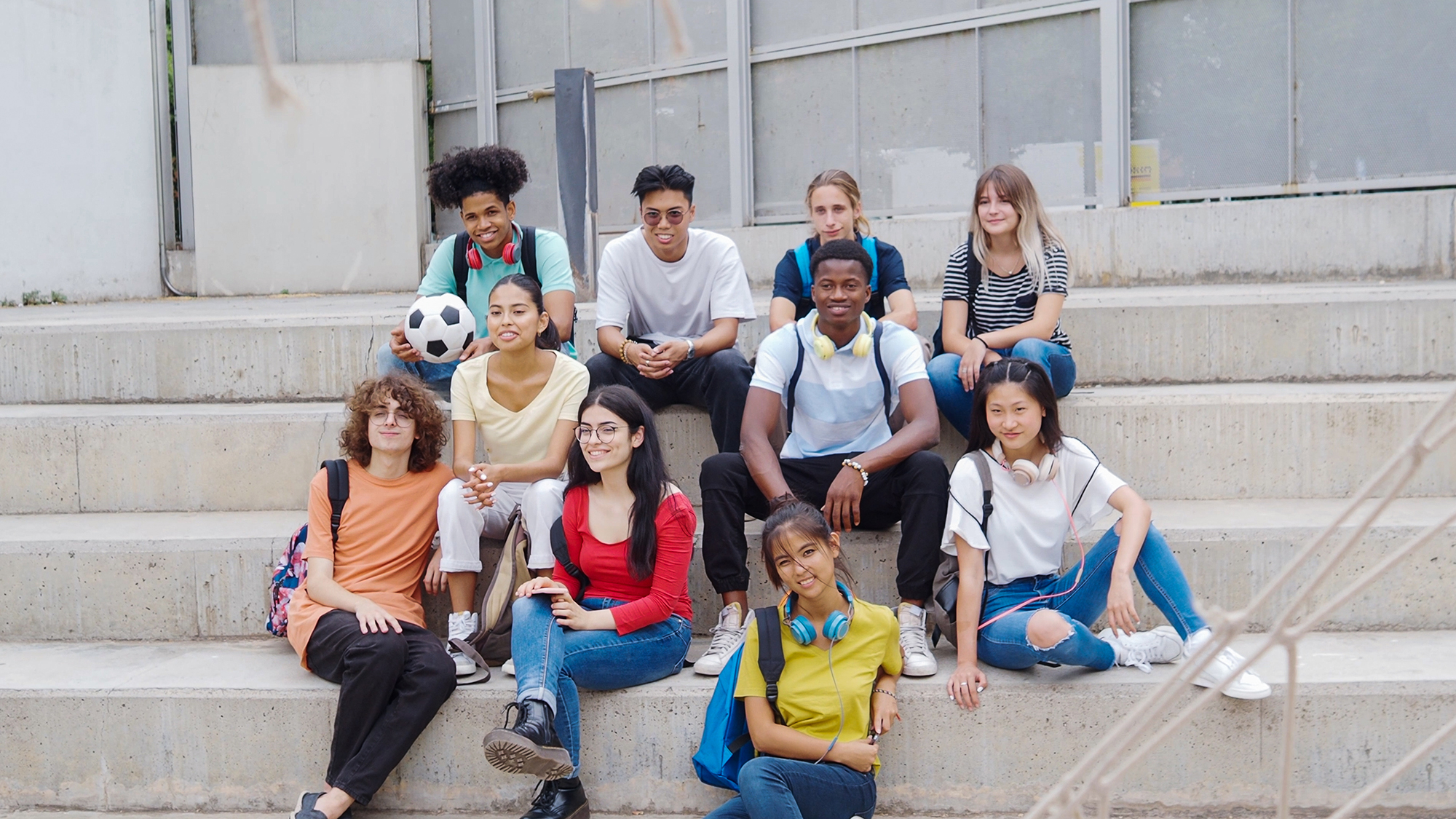Blending into your B-school’s Culture – A Guide for International Students
March 14, 2024 :: Admissionado Team
Studying in an American business school (B-school) can be a transformative experience for international students. However, the journey comes with its unique challenges, including blending into a new culture and mastering English. This guide provides practical strategies to help you navigate these challenges, ensuring you maximize your B-school experience and set yourself up for future success.
Understanding the Challenge
International students at American schools have reported that they often struggle to form meaningful relationships with U.S. students. This lack of connection can hinder the full experience of their chosen programs. While language barriers, culture clash, and time constraints are often cited as reasons, being proactive and resourceful can help overcome these obstacles.
Maximizing Your B-School Experience
Join Student Groups
Participating in student groups is one of the best ways to integrate into B-school culture. These groups can range from professional associations to hobby-based clubs. By joining these groups, you can network with peers, meet students who share similar interests and career goals, and develop lasting friendships and professional connections. Additionally, taking on roles within these organizations allows you to build your leadership and teamwork skills, while engaging with students from different backgrounds helps you gain new insights and broaden your understanding of various cultures and industries.
Attend Networking Events
Networking events are essential for building professional connections. These events include career fairs, industry conferences, and social mixers. To make the most of these opportunities, it’s important to prepare ahead by researching the event, the attendees, and the companies represented. Have your elevator pitch and resume ready. Be proactive by introducing yourself and initiating conversations instead of waiting for others to approach you. After the event, follow up with the contacts you made; a simple thank-you email can help maintain the connection and build a lasting relationship.
Socialize Beyond Study Groups
While study groups are crucial for academic success, socializing outside of these settings is equally important. Organize social events such as dinners, movie nights, or outings with your study group members to build stronger bonds in informal settings. Take time to explore the local area with your peers by visiting museums, parks, and cultural landmarks to experience the city together. Additionally, participating in extracurricular activities, such as sports, arts, or community service projects, provides a relaxed environment to make new friends and enrich your overall B-school experience.
Improving Your English Proficiency
Mastering English is essential for international students aiming to blend seamlessly into American B-school culture and maximize their educational experience. Proficiency in English not only enhances your ability to excel academically but also significantly improves your social and professional interactions. This section will provide you with practical strategies to improve your academic, social, and professional English skills, ensuring you can fully immerse yourself in the B-school environment and build meaningful connections with peers and professionals alike. By honing your English proficiency, you will be better equipped to navigate the challenges of studying in the U.S. and achieve your career aspirations.
Academic English
Academic success depends heavily on your ability to understand and communicate in English. Here are ways to improve:
- Read Textbooks: Utilize free digital resources and courses on platforms like Khan Academy. Regularly read science, history, and non-fiction books such as “Guns, Germs, and Steel” by Jared Diamond, “The Tipping Point” by Malcolm Gladwell, and “Steve Jobs” by Walter Isaacson.
- Engage with The News: Read magazines, newspapers, and journals like Time, The Economist, and The New York Times to stay informed and improve your reading skills.
- Participate in Class: Actively engage in class discussions, presentations, and group projects to improve your fluency and confidence. Don’t hesitate to ask questions or seek clarification when needed.
Social English
Fluent social English is essential for networking and making friends. Here are tips to enhance your social English:
- Improve Listening Skills: Use resources like VOA, Deep English, and podcasts to practice listening. Engaging with these materials can help you understand different accents and improve your comprehension.
- Join Student Organizations: Engage in dorm government, charities, school newspapers, and sports clubs to meet new people and practice your English. These organizations often have events and activities that encourage interaction.
- Be Friendly and Open: Introduce yourself to classmates and dorm neighbors to start conversations and build friendships. Practice small talk and show genuine interest in others.
Professional English
If you aim to work for a U.S.-based company, proficiency in professional English is vital. Here’s how to prepare:
- Engage with Your Industry: Read industry publications, attend conferences, and network within your field. Staying updated with the latest trends and developments in your industry will make you more knowledgeable and confident.
- Volunteer: Volunteering helps improve your English and provides networking opportunities. It also demonstrates your commitment to contributing to the community, which can be impressive to potential employers.
- Work with a Mentor: A mentor can guide you through the nuances of professional English and help you prepare for job interviews. Seek out mentors who have experience in your field and can provide valuable insights and advice.
Overcoming Cultural Barriers
Understanding American Culture
To blend into American B-school culture, it’s essential to understand and appreciate the cultural nuances. This understanding will help you navigate social interactions, build relationships, and integrate more seamlessly into your new environment. Here are some key aspects to consider:
Communication Style
Americans tend to be direct and value clarity and conciseness in communication. This means that when you’re speaking or writing, it’s important to:
- Be Clear and Straightforward: Avoid ambiguous language and get to the point quickly. This direct approach is appreciated and often expected in both professional and academic settings.
- Ask Questions: If you’re unsure about something, don’t hesitate to ask for clarification. This shows that you are engaged and willing to learn.
- Use Active Listening: Pay close attention to what others are saying and respond thoughtfully. This demonstrates respect and helps build rapport.
Time Management
Punctuality is highly valued in the U.S. Being on time is seen as a sign of respect and reliability. To manage your time effectively:
- Plan Ahead: Make sure you know the time and location of your classes, meetings, and events. Plan your route and account for potential delays.
- Use Calendars and Reminders: Utilize digital tools such as calendars and reminder apps to keep track of your schedule and deadlines.
- Be Prepared: Arrive early and be ready to participate. This proactive approach will leave a positive impression on your peers and professors.
Social Etiquette
Understanding social norms and etiquette will help you feel more comfortable in various settings. Here are some tips:
- Tipping in Restaurants: In the U.S., it is customary to tip servers in restaurants, usually around 15-20% of the total bill. This is an important aspect of dining culture.
- Addressing People: Use titles and last names when first meeting someone, especially in formal settings. Once you get to know them, they may invite you to use their first name.
- Social Gatherings: Participate in social events and gatherings, whether organized by the school or informal get-togethers. This is a great way to make friends and practice your English.
Building Cultural Competence
Cultural competence involves understanding and respecting cultural differences, which is crucial for successful integration. To build this skill:
Attend Cultural Events
Participate in cultural events and activities organized by your school or community. These events provide an opportunity to learn about different cultures and traditions. Examples include:
- International Festivals: Attend festivals that celebrate various cultures, offering food, music, and performances.
- Cultural Clubs: Join clubs that focus on different cultural backgrounds. These clubs often host events and activities that can broaden your understanding and appreciation of diversity.
Take Cultural Sensitivity Workshops
Many universities offer workshops on cultural sensitivity and diversity. These workshops can help you navigate cultural differences effectively by:
- Providing Knowledge: Learn about the cultural norms and values of different groups.
- Enhancing Skills: Develop skills to communicate respectfully and effectively across cultures.
- Promoting Inclusion: Understand the importance of inclusivity and how to contribute to a welcoming environment.
Engage with Local Communities
Volunteering or participating in community events allows you to interact with locals and gain a deeper understanding of American culture. Consider the following:
- Volunteer Opportunities: Join volunteer programs in your community. This not only helps you give back but also provides a platform to meet new people and practice your English.
- Community Events: Attend local fairs, markets, and cultural celebrations. Engaging in these activities can help you feel more connected to your new environment.
- Neighborhood Involvement: Get to know your neighbors and participate in neighborhood events. Building relationships with those around you can enhance your sense of belonging.
Utilizing Campus Resources
Most universities offer a range of academic support services to help students succeed. These services include writing centers, where you can get assistance with writing assignments, from brainstorming ideas to proofreading. Additionally, tutoring services are available to provide help with specific subjects or courses. The library is another valuable resource, offering access to research materials, study spaces, and academic workshops designed to enhance your learning experience.
Career services are also crucial in preparing for your future career. Through career counseling, you can receive guidance on career planning, resume writing, and job search strategies. You will also have access to internship and job listings relevant to your field, allowing you to find opportunities that align with your career goals. Furthermore, attending workshops and events on networking, interviewing, and professional development can provide you with the skills and knowledge needed to succeed in the job market. By taking full advantage of these campus resources, you can enhance both your academic and professional development during your time at B-school.
Conclusion
Blending into American B-school culture and mastering English are achievable goals for international students. By participating in student groups, attending networking events, improving your academic, social, and professional English, and utilizing campus resources, you will not only enhance your educational experience but also pave the way for a successful career. Embrace these opportunities, immerse yourself in the culture, and make the most of your time studying in the U.S.



